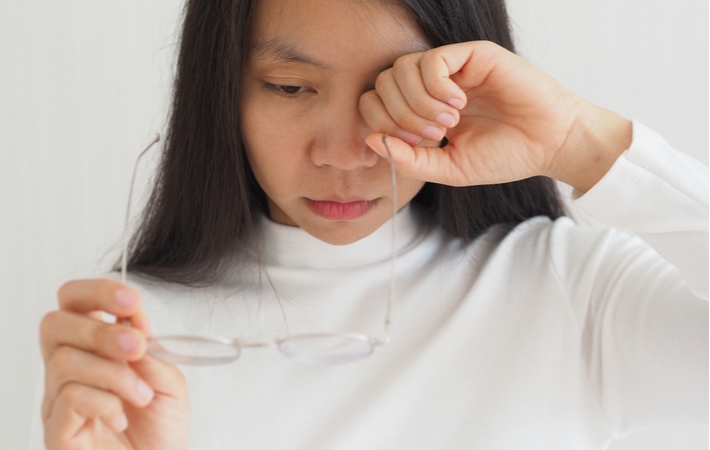Dry eye disease is a common condition resulting from inadequate tear production, which can cause various irritating symptoms. Patients who live with stinging, dry eyes may also experience floaters in their vision, and wonder if these symptoms are connected.
At Perspective Eye Center, we strive to ensure our patients have access to the most up-to-date information related to eye health. Your comfort and safety are always the highest priority, and we want you to have all the facts about floaters and dry eye disease.
We’ve put together some information to help shed light on these 2 eye problems. Our knowledgeable and experienced team is available to answer any questions about overall eye health, and possible treatments options.
Reach out to us today; we’d love to hear from you!
Dry Eye Disease
Dry eye disease occurs when your tears don’t provide enough lubrication to keep your eyes comfortable, leaving them without proper hydration and protection. This irritating condition results from a tear film imbalance, and it leaves eyes feeling sore, strained, and gritty.
There are 3 essential layers in your tear film, and each work hard to keep your eyes hydrated and free of bacteria:
- Outer layer: The outer oily lipid layer helps slow down tear evaporation, keeping the surface of the eye smooth.
- Middle layer: The middle watery aqueous layer keeps everything moist, and directs nutrients to their correct position on the eye.
- Inner layer: The inner mucous layer keeps tears connected to the eyeball.
Many health conditions affect the production of crucial tear film components, which may also contribute to inflammation and blockages that affect visual health.
Dry eyes can be exacerbated by conditions like diabetes, blepharitis, and rheumatoid arthritis, as well as factors like:
- Age: Adults over 50 are more susceptible to dry eye.
- Allergies: Allergy medications may affect your tear film production.
- Vitamin A deficiency: One of the leading symptoms of vitamin A deficiency is dry, irritated eyes.
- Hormonal changes: Menopause, pregnancy, or hormone replacement therapy may affect tear film production.
- Environment: Living in a dry climate can aggravate symptoms of dry eye.
- Medication: Many medications, including heartburn medications, birth control pills, and sleeping pills, can affect tear film production.
- Contact lenses: Dry eye symptoms can result from the extended use of contact lenses.
- LASIK: Inadequate tear film production can be a side effect of LASIK eye surgery.
Irritating Symptoms of Dry Eyes
Signs of dry eyes can occur intermittently or chronically. Here are some symptoms of dry eye disease:
- Irritated, gritty eyes
- Burning or scratchy sensation
- Overly watery eyes
- Red eyes
- Burning sensation
- Sensitivity to light
- Excess mucus
Treatment solutions for dry eye will vary depending on the condition’s root cause. If you’re suffering from dry and irritated eyes, contact our incredible team at Perspective Eye Center. We want our patient’s eyes to feel healthy and comfortable.
Reach out to us for more information on personalized dry eye therapies. You deserve relief!

Eye Floaters
Eye floaters are often described as spots in your visual field that seem to move away when looked at directly. They may appear as:
- Black spots
- Grey specks
- Strings
- Cobwebs
Eye floaters typically result from age-related changes; the vitreous inside the eye is usually gel-like, but as we grow older, it becomes less dense. Vitreous contains tiny fibers that can clump and cast shadows on the retina. These shadows are the eye floaters seen in your visual field.
In some instances, eye floaters can be caused by an injury or illness, like:
- Eye injuries
- Inflammation
- Bleeding in the eye
- Side effects of certain medications
- Eye infections
- Retinal tears
- Retinal detachment
- Vitreous detachment
Eye floaters can signify a severe eye condition, and Perspective Eye Center recommends contacting your optometrist right away if you notice:
- More eye floaters than usual
- Sudden onset of eye floaters
- Flashes of light at the same time as floaters
- Any darkness at the sides of your visual field
Are Dry Eyes and Floaters Connected?
Experts have not found a link between dry eye disease and floaters. Eye floaters are age-related changes caused by deteriorating vitreous humor, resulting in tiny floating particles, and dry eye disease is linked to inadequate tear production.
Although these conditions are unrelated, you may experience them simultaneously as both can occur due to aging. Eye floaters and dry eyes also share similar risk factors; traumatic eye injuries, medical conditions like certain autoimmune diseases, and inflammation-causing illnesses can affect visual health.
Working Hard to Keep You Comfortable
If you’re frequently experiencing dry eyes and floaters, book an appointment at Perspective Eye Center. We’ll work closely with you to find the source of your discomfort, and customize a treatment option that optimizes your visual health. Everyone’s unique, and solutions can vary depending on the cause of the condition. One thing’s for sure–you don’t need to suffer through painful and annoying symptoms. You deserve the healthiest vision possible, and our team is waiting to help. Call us today!



